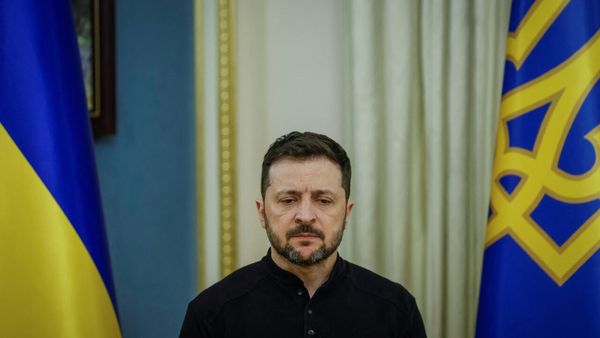The Lok Sabha on Tuesday took up the discussion on the three redrafted Bills that seek to replace the British-era criminal laws. Union Home Minister Amit Shah introduced the Bills in the Lok Sabha last week.
The three Bills are the Bharatiya Nyaya (Second) Sanhita Bill, 2023; the Bharatiya Nagarik Suraksha (Second) Sanhita Bill, 2023; and the the Bharatiya Sakshya (Second) Bill, 2023. They will replace the Indian Penal Code, 1860; the Code of Criminal Procedure, 1898; and the the Indian Evidence Act, 1872.
Most of the Opposition members were not present in the House when the Bills were discussed. As many as 95 Lok Sabha members from the INDIA bloc have been suspended from the House since December 14 after they demanded a statement from Mr. Shah on the security breach in Parliament.
The Home Minister is expected to speak on the Bills on Wednesday.
Also read: Revised criminal law bills: Key changes explained
Women MPs from the Bharatiya Janata Party (BJP) said they should be given enough time to speak on the Bills that give priority to tackling crimes against women and children.
Jaskaur Meena, BJP MP for Dausa in Rajasthan, said women were not being treated on an equal footing even in the Lok Sabha. “We have been sitting here since morning, even then we are called at the end to speak. Can’t we give elaborate speeches just like Satya Pal Singh and Ravi Shankar Prasad? But you will have to give us adequate time. I want to request the Chief Whip that you ensure that women members are called to speak at number two or three. You are calling us at number 15. We have prepared for the past three days,” Ms. Meena said.
Earlier, BJP MPs Sangita Kumari Singh Deo and Sunita Duggal also said that they should be given enough time to speak on the three Bills.
Mr. Prasad, while speaking on the Bills, said that some Opposition members were directly or indirectly supporting the persons accused of jumping into the Well of the House on December 13.
“Aren’t there problems in Kerala, Karnataka or West Bengal? Will they tolerate if someone sets fire or applies some powder in these Assemblies,” Mr. Prasad asked.
“One thing was special about the British, even if the Britishers committed crimes, they did it under the garb of law. They wanted amiable people...their skin may be Indian, mind must be British. All big universities in India were founded around the same time when these laws were framed. Why the law was not amended earlier? Why did it take 500 years for us to build the Ram Temple. Why do we have to struggle for Kashi Vishwanath Mandir and Mathura temples?” Mr. Prasad asked.
He added that the new Bills would pave the way for the digitisation of first information reports, chargesheets and case diary while search and seizures would be videotaped without which the chargesheets would not be accepted by the court.
Bhartruhari Mahtab of the Biju Janata Dal, while supporting the Bills, said that the IPC was 163 years old, the Indian Evidence Act 130 years old and the CrPC 51 years old.
He, however, cautioned that Section 150 of the the Bharatiya Nagarik Suraksha (Second) Sanhita Bill, 2023 continued to criminalise any act that excites or attempts to excite secessionist activities and penalises a person who indulges in any such act, thereby providing law enforcement agencies a greater discretion to decide what can be brought within the fold of an act endangering integrity and security of the country.
“This discretion is wide spectrum,” he said, adding that the term “separatist activity” can be interpreted in several ways and can be used as a political tool to stop Opposition parties from organising protests against any of the policies of the government.
The redrafted law retains the provision of sedition, though under a different name.
Tejasvi Surya of the BJP said that in many dowry-related cases, senior citizens were harassed due to false cases despite multiple Supreme Court rulings on arbitrary arrests. “For the first time, by codifying this as a principle, interests of those who are weak... senior citizens are protected from arbitrary arrests,” Mr. Surya said.
Satya Pal Singh of the BJP said the doors of the Supreme Court were opened at 2 a.m. for a terrorist, but when it came to poor people, they have to wait for years.
He said the word “India” was a sign of slavery, while “Bharat” is our pride.
He said that Article 348 of the Constitution, which says that hearings and judgments in the Supreme Court and the High Courts and text of the Bills should be in English, needed to be changed.
“In Tamil Nadu, most names are inspired by Sanskrit, I would like to tell the MP who objected to the word ‘Bharatiya’ in the Bill, one should not be apologetic about it,” he said.
He demanded that adultery that was struck down by the Supreme Court should be made a crime. “Supreme Court said if a man can commit adultery, so can a woman? Which family or judge will want that adultery be allowed in their family?Families will break, will lead to an increase in divorce cases and will encourage juvenile criminals,” Mr. Singh said.
Divyam Agarwal, partner, JSA Advocates and Solicitors, said, “It appears that the changes in the Bills have been made both to incorporate the suggestion of the Parliamentary Standing Committee, as well as the broader legal fraternity. For instance, Section 150 of BNSS which in essence deals with the offence of sedition, has been majorly redrafted. Instead of broadly criminalising acts threatening the integrity of India, it now criminalises any act or omission which will or is likely to facilitate a war against the Government of India.”







